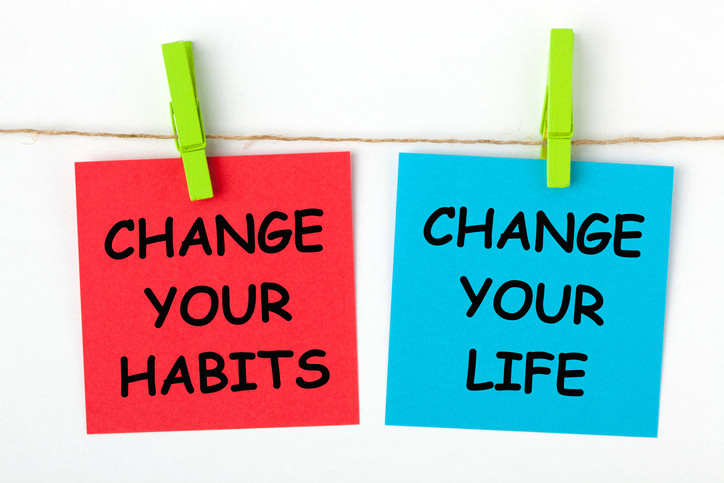Understanding one principle about habit formation can make all the difference.
by Thomas Rutledge Ph.D.
KEY POINTS
- Many people mistakenly attribute their bad habits to character flaws such as laziness or lack of self-discipline.
- The real reason that bad habits thrive is because they produce immediate reinforcement.
- Most good habits don’t naturally provide immediate reinforcement. However, people can learn to create their own sources of reinforcement.
If you ever needed proof that God has a sense of humor, you need only look at how we’re wired to form habits. Humans are astonishing in their ability to habitualize almost any behavior. With sufficient practice, we can learn to perform tasks of mind-boggling complexity with little or no conscious effort: driving, dancing, playing musical instruments, and speaking multiple languages, among many others.
With our large brains and near limitless habit formation capacities, we possess the ability to master almost any craft and succeed at virtually any endeavor. Yet instead of elevating us to lives of superhuman quality, habits keep most people struggling just to get by. Why? Because the habits that come most naturally to us tend to be bad for our long-term health and happiness.
Although we can turn almost any behavior into a habit, all behaviors do not become habits equally. Because of the underlying biology of habit formation, some behaviors are converted into habits quickly and easily, whereas others behaviors become habits only with substantial time and repetition. Anytime you read information about how long it takes to form habits, take the response with a grain of salt. Remind yourself that it depends on the habit. For example, a child can master the habit of avoiding hot stoves after a single painful experience but may require months of parental assistance to brush their teeth or take their vitamins.
RELATED: How do We Determine Success or Failure
Adults show the same disparities. Consider the ease of forming convenience food habits versus the difficulty of forming nutritious eating habits. Compare the minimal effort required to fall into bad sleep habits versus the challenge of creating good sleeping habits. Procrastinating versus becoming proactive. Spending money versus the habit of saving and investing. In each of these cases, the first habit comes swiftly and naturally to us; the second takes prolonged practice and is fragile even once formed.
If these bad habit-good habit inequities seem unfair, keep in mind that they are not new. Reflect, for instance, on the “seven deadly sins” from the Bible and you may notice a pattern: All represent instinctive human behaviors that easily become enduring habits despite their vices. And each “sin” requires considerable learning and labor to replace with more virtuous habits.

Although some may prefer the interpretation that our affinity for bad habits is the product of a divine sense of humor, neuroscience offers a more useful interpretation. Specifically, bad habits are formed easily primarily because they are rapidly reinforced. Good habits, in contrast, generally are reinforced only much later. Using the above examples, junk food provides immediate gustatory pleasure and stress release; staying up late and sleeping in offer rapid entertainment and comfort rewards; procrastinating instantly spares us effort and risk; and spending gives us a momentary rush of positive emotions, especially if we found a good deal. In comparison, their good habit counterparts may require days, weeks, or even longer to enjoy benefits — even though these benefits are usually much larger than the smaller, immediate rewards of bad habits. To the human brain, the immediacy of the reinforcer is more important than the type or magnitude of the reinforcer.
We struggle to form good habits, therefore, not because of a lack of self-discipline or education but because we are biologically predisposed to repeat behaviors based on their immediate physical, social, and emotional consequences. This principle is true across the animal kingdom and likely predates humans by millions of years. However, only humans have the capacity to turn this principle to their advantage. Let’s look at how.
Using the immediate reinforcement principle to create healthy habits
In the modern world, behaving based on immediate consequences puts us on the road to mental illness, addiction, and metabolic diseases. Yet rather than being constrained by our native habit-forming tendencies, the human mind is uniquely able to create immediate positive consequences for behaviors that ordinarily take time to feel rewarding.
The typical person, for instance, may train for weeks to months to see pronounced exercise benefits. By then, most have given up due to the combination of the lack of visible progress and the immediate rewards offered by alternative behaviors such as social events or entertainment. Without changes to the reinforcement dynamics, this is a difficult cycle to break. To form lasting exercise or other healthy habits, we must introduce our own immediate reinforcers into the behavior. The reinforcement options are many, thankfully, including both external and internal rewards.
For example:
- Choosing a type or format of exercise we find most enjoyable
- Socializing the experience (e.g., workout partners, trainers, exercise groups, dogs)
- Building in competition, cooperation, novelty, or adventure
- Using a physical or online workout log to help visualize progress
- Reward ourselves for achieving daily milestones (e.g. getting to the gym, completing the workout, making a small improvement in performance, etc.)
The above are all examples of external reinforcers we can combine in real time with our desired behaviors to provide sources of immediate positive feedback. As useful as these external systems are, however, immediate internal reinforcers may be even more important for long-term success. Internal reinforcers for behaviors such as exercise, sleep, nutrition, and finances usually come in the form of constructive self-talk and visualization. A single workout may not produce any visible changes in your physique, for example, but this didn’t stop Arnold Schwarzenegger from visualizing changes in his muscles as he was training as a source of internal reinforcement.
High performers in almost every field, similarly, employ positive self-talk during their activities as a real-time strategy to inspire consistency, resilience, and achievement. Importantly, these high performers use many combinations of internal and external reinforcers to create rapid positive feedback; in contrast, most people not only lack these strategies for creating immediate positive feedback for themselves, but they do the opposite. They unintentionally create immediate negative feedback for themselves through self-criticism and other negative self-talk when they are trying to form a new habit. This makes healthy habit formation nearly impossible.
Summary
Good news! God probably isn’t punishing you. Instead, bad habits are easy and good habits are hard simply because of how they are reinforced. We can use the rules of reinforcement for us instead of against us, however. With practice, anyone can learn to incorporate sources of immediate reinforcement to form the habits of success and improve their health, wealth, and quality of life.

